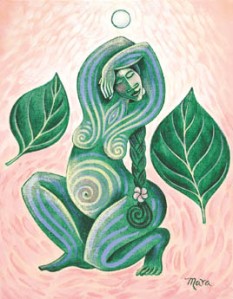I am starting my mini-series about the deities that I currently honour with a goddess who I have known about all my life but only recently felt compelled to build a relationship with. Given that I have been coping with grief and loss for many months, Aphrodite’s bright, vibrant energy felt very attractive to me, a much needed balance to my own journey through Persephone’s shadows.
As I began to read about her, it struck me how much in the popular imagination of our culture, that her deeper mysteries and power have been rather reduced. She is often depicted as a sex kitten, which is not to say she doesn’t have her flirtatious, promiscuous moments, but as a goddess of love, passion, union and sex, this rather shallow interpretation minimizes the depth and impact of all she represents. After all, love and sex can initiate our most profound, transformative experiences. Aphrodite is the energy in nature that draws things into union – a connecting force; through her we build relationship not only with lovers, but all the other things in our life that draw passion and love from us – be it our life’s work, nature, our families, our creativity. She teaches us that such unions of passion and love change us, challenge us and work on us. Anyone who has ever been in a long-term relationship will know that in our lover’s eyes we ultimately find ourselves – the very best of who we are but also our shadow. Through union with another, we are offered the opportunity to not only know our partners more intimately but, in the process, learn more about ourselves; this can been the best of journeys and the most painful but it will never leave us the same – it is just not meant to.
It has been of great interest to me that Aphrodite and Persephone have mythic connections. They share a love of Adonis – after his death he lives part of the year in the underworld with Persephone and part in the land of the living with Aphrodite. They are also both key players in the story of Psyche and Eros. Psyche is tested by Aphrodite, given almost impossible tasks to prove her worthiness for the love of Aphrodite’s son, who himself is also a god of love. Psyche translates as ‘breathe’ and can be understood in the deeper sense as ‘soul’. This feels key to me with regard to Aphrodite’s more profound mysteries – the story of Psyche seems to suggest the soul’s growth and transformation through its encounter with love. Psyche’s trials on her journey to be reunited with Eros, takes her to the Underworld – Persephone’s realm ; love with all its pleasures and joys, undoubtedly has its shadow side, and we often meet these head on in our relationships: jealousy, betrayal and conflict. Like Psyche, our naivety about love and ourselves is burnt away in the crucible of our emotions, and the most direct and powerful of arenas for this transformation to manifest is our relationships with others.
This link between Aphrodite and Persephone resonates with the earlier Sumerian mythology of Inanna and her sister Ereshkigal . Inanna was a goddess of fertility, love, lust and battle, and like Aphrodite was associated with the planet Venus, as morning and evening star. Although the Classical Aphrodite was only associated with love, we can see echoes of Inanna in her connection to the God of War, Ares. Inanna descends to the Underworld realm of her sister Ereshkigal and is kept prisoner there. Like the Persephone/Aphrodite/Adonis myth, we see the seasonal story enacted, but it also says much about what happens when love is lost to us or our assumptions about love are dismantled. When love turns sour, or love is denied us through rejection, conflict or even bereavement, we too must engage with our own emotional descent. This journey, although challenging, potentially deepens not only our understanding about love but our ability to love in a more profound and authentic way.
When we examine the power of love to impact upon our very souls, Aphrodite’s ‘Sex Kitten’ image really doesn’t do her justice. Having said this, she is an essentially joyful goddess – love may bring us to our knees on occasions but it also brings us our happiest moments. For me, she is key to our creativity. As a goddess of attraction and union, she opens us to life and experience. When we look through her eyes, we are struck by the beauty not only of our beloved but of the world. Her energy is expansive, it is hard to contain it – love flows outward, to be miserly in its expression means that it shrivels and dies. Aphrodite knows that energy functions in exchange –the more we give, the more we have. She is a goddess that heals the split between body and spirit because for her there is no separation; through the sensual pleasures of the body and the intense emotional connection that sex can bring, she affords us the opportunity to ground ourselves in the world and in our bodies in the most joyful and energising ways.
Born from the foam, she is also a Goddess of the ocean and as fishermen once prayed to her to guide them through choppy seas to safe harbour, she can protect and navigate us through the turbulent waters of our emotions. I am lucky enough to live merely feet from the ocean and I watch over Aphrodite’s waters every day. I am struck by how relentlessly changing they are, very rarely truly flat calm. But Aphrodite’s numerous ancient epithets had her as Lady of Safe Harbour, and through her connection to Venus, Goddess of Gardens, she can bring us to a place of peaceful sanctuary.
These last few weeks have seen Venus as the evening star. I have watched her from my balcony shining above the sea as the sun is setting. She is stunningly beautiful and bright. As evening star, we watch her set below the horizon on her Underworld journey and we are reminded of our capacity to hold onto hope in our darkest times. As the morning star, she seemingly rises up from the earth, returning from the Underworld and teaching us of renewal. These settings and risings can remind us about the cycles of love, the way it can renew, burn fiercely, die back , then renew again, each of these emotional states a gift that can deepen our understanding of who we are and how we relate.
Aphrodite is both profound love and passion, and the horniest sex – she doesn’t see the separation between these. She can bring flippant encounters that are pleasurable but will never be lasting, but she truly comes into her own in our deepest love matches. The Greeks had her as both Aphrodite Urania, the starry goddess of Spiritual Love and Aphrodite Pandemos, earthy, goddess of the masses: Aphrodite contains these seemingly contradictory states within her and confounds all our most limiting assumptions about love.
She is also supremely helpful in teaching us how to love ourselves. It may be a cliché to say it but we love others more effectively, and perhaps less painfully, when we have a healthy sense of self-appreciation. Aphrodite can teach us to take tender loving care of ourselves and to love and take pleasure in our bodies and beings; she can also encourage us to enjoy life and its pleasures, to revel in ourselves and the things that bring us joy.
Aphrodite came to Classical Greece via Cypress. The Cypriot Aphrodite was a much more rounded and complex goddess who, for me, is closest to how I experience her. She is essentially life-affirming; demanding that we engage with it, be touched, moved and changed by it. When we hammer up boards to keep life out, she will come like a tsunami to break our defences but when we embrace her fully and openly, we are rewarded with sweetness, depth, joy and transformation. She is a garden in blossom, a sun-filled sea, an unforgettable kiss; she is every moment that reminds you how grateful you are to be alive; she is the flower that opens to the bee.


















